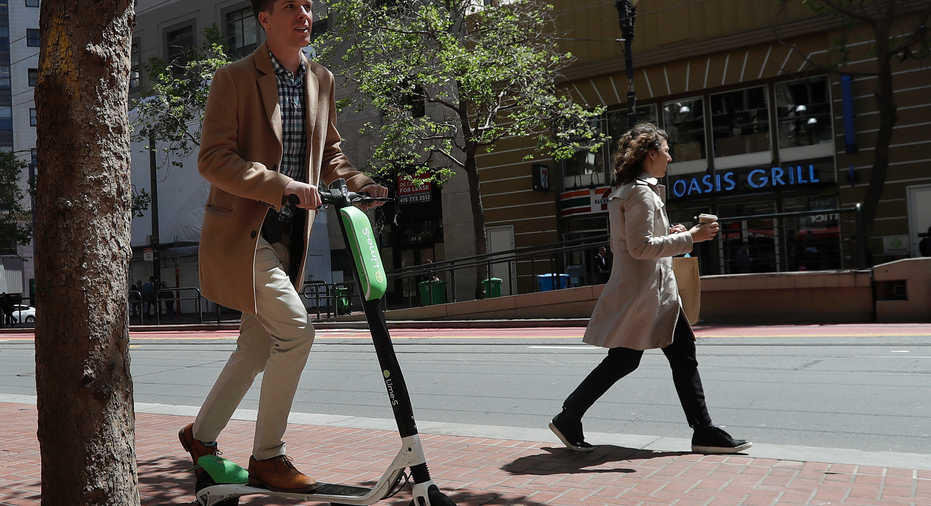San Francisco to require permits for rental scooters

SAN FRANCISCO – San Francisco is ordering three companies that began renting motorized foot-pedal scooters in the city last month to stop operating until they can ensure riders are obeying state laws and that the devices are not a hazard to the public.
City Attorney Dennis Herrera said in letters to LimeBike, Bird and Spin that the city has received numerous complaints of riders whizzing by on sidewalks, not wearing helmets and parking the devices on sidewalks, obstructing the right of way.
Despite previous warnings, the scooter companies are "creating a public nuisance on the city's streets and sidewalks and endangering public health and safety," he wrote.
Hundreds of the scooters began appearing around the tech-friendly city in March, and were quickly picked up by riders. They have become an annoyance for many because they do not require docking stations and can be set down anywhere when a ride is over.
California law requires riders of motorized scooters to wear a helmet, not carry passengers and not operate on sidewalks. The rules appear in videos riders must watch and sign off on when they download the cellphone app that unlocks the scooters.
Herrera provided the companies with photographs showing scooters lying in the middle of sidewalks and people riding without helmets. They have until April 30 to address complaints, he said.
Jack Handley, who works at his family-run hotel, said he pays about $2 to use a scooter for about five minutes, which he said he rides on the street.
"I can grab one and zoom on over to where I need to go and then zoom right back," Handley said after dropping off a LimeBike outside a FedEx office in downtown San Francisco.
He said he would stop using them if he is required to get a permit or wear a helmet.
"I'm not going to carry a helmet with me," he said. "I would rather walk than go through that headache."
The San Francisco Board of Supervisors on Tuesday approved legislation requiring the scooter companies have transit agency permits to operate and to allow public workers to remove scooters without permits from streets or sidewalks.
The ordinance requires companies to educate users about how to safely ride and store the devices and establishes fines starting at $125 per scooter.
"Sidewalks are for pedestrians and strollers and disabled individuals and wheelchairs," said the law's author, Supervisor Aaron Peskin.
"We're not trying to ban them," he said. "But we want to make sure that they're operating in a way that is helpful to the transportation problems of San Francisco."
San Mateo, California-based LimeBike will roll out new initiatives next week following the board's vote, said company spokesman Joe Arellano.
"In response, we are updating our current community outreach plan to address the city's concerns about pedestrian safety, parking compliance, and rider education," Arellano said in a statement Tuesday.
David Estrada, chief legal officer for Santa Monica, California-based Bird Rides Inc., said the company wants to work with city officials to solve traffic problems in San Francisco.
"They request we do some education for riders and request we implement some technology to address some of the issues, we have all of that in the works," Estrada said.
The company, whose founder Travis VanderZanden was chief operating officer at Lyft and former vice president of global driver growth at Uber, started a pilot program Tuesday requiring San Francisco riders to take a photo showing how they parked the scooter at the end of their trip, Estrada said.
Users who repeatedly violate the rules will be suspended, said Kenneth Baer, a spokesman for Bird. "San Franciscans have logged more than 90,000 miles on Birds, which shows that there is great demand for new, environmentally friendly ways to get around this great city," Baer said.
Santa Monica's city attorney in December filed a criminal complaint against Bird, saying the company was operating without a permit and had ignored required licensing and orders to remove the scooters from sidewalks. Bird pleaded no contest and agreed to pay more than $300,000 in fines and secure proper licenses.
A spokesperson for San Francisco-based Skinny Labs Inc., also known as Spin, did not immediately return emails seeking comment Tuesday.
___
This story has been clarified to note Peskin was the law's author, not sponsor.
___
Associated Press writers Terry Chea and Ryan Nakashima contributed to this report.



















